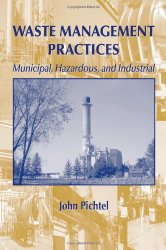 The Waste Crisis: Landfills, Incinerators, & the Search for a Sustainable Future
The Waste Crisis: Landfills, Incinerators, & the Search for a Sustainable Futureby Hans Y. Tammemagi
Publisher: Oxford University Press
ISBN: 0195128982
As populations continue to increase, society produces more and more waste. Yet it is becoming increasingly difficult to build new landfills, and the existing landfills are causing significant environmental damage. Finding solutions is not simple; the problem is enormous in size, vital in terms of its impact on the environment, and complex in scope.
This book provides a vast look at solid waste management in North America and seeks solutions to the waste crisis. It describes the magnitude and complexity of the problem, focusing on municipal wastes and placing them in the perspective of other wastes such as hazardous, biochemical, and radioactive debris.
 Handbook of Solid Waste Management
Handbook of Solid Waste Managementby Frank Kreith, George Tchobanoglous
Publisher: McGraw-Hill Professional
ISBN: 0071356231
In a world where incinerators are no longer an option and landfills are filled to capacity, cities are hard pressed to find a solution to the problem of what do with their solid waste. In this practical resource more than 20 top industry and government experts provide all the tools needed to successfully plan, design, implement, and manage a cost-efficient, environmentally sound municipal waste management system.
Focusing on the six primary functions of an integrated system: source reduction, toxicity reduction, recycling and reuse, composting, waste-to-energy combustion, and landfilling – the Handbook fully explores each technology and examines its problems, costs, and legal and social ramifications.
 Constructed Wetlands for the Treatment of Landfill Leachates
Constructed Wetlands for the Treatment of Landfill Leachatesby George Mulamoottil, Edward A. McBean, Frank Rovers
Publisher: CRC Press
ISBN: 1566703425
Constructed wetlands are proving to be the best natural treatment system for landfill leachates. Most of the contaminants in landfill leachates are degraded in treatment wetlands. Potential for long-term sustainability and significant cost savings are attractive features of this eco-technology.
Documentation of the experience in this use of constructed wetlands has been limited. Constructed Wetlands for the Treatment of Landfill Leachates is the first compilation of the results of research from North America and Europe. Originally presented at an international symposium, this collection of papers offers the most recent research findings from the leading researchers in this new and innovative natural treatment system.
 Geotechnology of Waste Management
Geotechnology of Waste Managementby Issa Oweis, Raj Khera
Publisher: Cengage Learning
ISBN: 0534945244
The Second Edition of GEOTECHNOLOGY OF WASTE MANAGEMENT provides an up-to-date discussion of environmental geotechnology, an increasingly important area of study and real-world application in the field of civil engineering. Unlike encyclopedic references that provide little context for understanding and applying the subject matter, Oweis and Khera's text guides students through practical discussions of solid wastes, their index properties, settlement characteristics, strength behavior, and hydraulic properties.
Landfill design coverage includes site investigation and selection, geosynthetic and soil liner systems, leachate generation and detection, erosion control and caps, gas generation and management, foundation and slope stability, and applicable regulatory guidelines.
 Waste Management Practices: Municipal, Hazardous, and Industrial
Waste Management Practices: Municipal, Hazardous, and Industrialby John Pichtel
Publisher: CRC Press
ISBN: 0849335256
A practical guide for the identification and management of a range of hazardous wastes, Waste Management Practices: Municipal, Hazardous, and Industrial integrates technical information including chemistry, microbiology, and engineering, with current regulations. Emphasizing basic environmental science and related technical fields, the book is an introductory manual for waste management as mandated by Resource Conservation and Recovery Act and related statutes.
The first section of the book provides an overview of the historical and regulatory development of waste management. The second section delineates the management of municipal solid waste and includes coverage of conventional (e.g. sanitary landfill, aerobic composting) and innovative (bioreactor landfill, high-solids anaerobic digestion) technologies.
 The Solid Waste Handbook: A Practical Guide
The Solid Waste Handbook: A Practical Guideby William D. Robinson
Publisher: Wiley-Interscience
ISBN: 0471877115
A comprehensive, single-source reference of current issues in solid waste management designed as an aid in decision-making and assessment of future trends. Covers public perceptions, legislation, regulation, planning and financing, and technologies and operation.
Reviews the evolution of waste management since the passage of the Resource Conservation and Recovery Act of 1976, amended in 1978, 1980 and 1984. Examines common and divergent public and private concerns, including an in-depth review of public perceptions and their effect on planning and implementation.
 Standard Handbook of Hazardous Waste Treatment and Disposal
Standard Handbook of Hazardous Waste Treatment and Disposal Air Pollution: Its Origin and Control
Air Pollution: Its Origin and Control